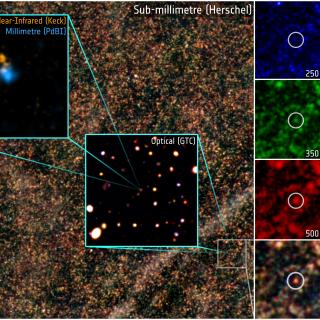Bibcode
Bendo, G. J.; Wilson, C. D.; Pohlen, M.; Sauvage, M.; Auld, R.; Baes, M.; Barlow, M. J.; Bock, J. J.; Boselli, A.; Bradford, M.; Buat, V.; Castro-Rodríguez, N.; Chanial, P.; Charlot, S.; Ciesla, L.; Clements, D. L.; Cooray, A.; Cormier, D.; Cortese, L.; Davies, J. I.; Dwek, E.; Eales, S. A.; Elbaz, D.; Galametz, M.; Galliano, F.; Gear, W. K.; Glenn, J.; Gomez, H. L.; Griffin, M.; Hony, S.; Isaak, K. G.; Levenson, L. R.; Lu, N.; Madden, S.; O'Halloran, B.; Okumura, K.; Oliver, S.; Page, M. J.; Panuzzo, P.; Papageorgiou, A.; Parkin, T. J.; Pérez-Fournon, I.; Rangwala, N.; Rigby, E. E.; Roussel, H.; Rykala, A.; Sacchi, N.; Schulz, B.; Schirm, M. R. P.; Smith, M. W. L.; Spinoglio, L.; Stevens, J. A.; Sundar, S.; Symeonidis, M.; Trichas, M.; Vaccari, M.; Vigroux, L.; Wozniak, H.; Wright, G. S.; Zeilinger, W. W.
Referencia bibliográfica
Astronomy and Astrophysics, Volume 518, id.L65
Fecha de publicación:
7
2010
Revista
Número de citas
141
Número de citas referidas
135
Descripción
We use Herschel Space Observatory data to place observational
constraints on the peak and Rayleigh-Jeans slope of dust emission
observed at 70-500 μm in the nearby spiral galaxy M81. We find that
the ratios of wave bands between 160 and 500 μm are primarily
dependent on radius but that the ratio of 70 to 160 μm emission shows
no clear dependence on surface brightness or radius. These results along
with analyses of the spectral energy distributions imply that the
160-500 μm emission traces 15-30 K dust heated by evolved stars in
the bulge and disc whereas the 70 μm emission includes dust heated by
the active galactic nucleus and young stars in star forming regions.
Proyectos relacionados

Formación y Evolución de Galaxias: Observaciones Infrarrojas y en otras Longitudes de Onda
Este grupo desarrolla varios proyectos extragalácticos en diferentes rangos del espectro electromagnético utilizando satélites y telescopios en tierra para estudiar la evolución cosmológica de las galaxias y el origen de la actividad nuclear en galaxias activas. En el aspecto instrumental, el grupo forma parte del consorcio internacional que ha
Ismael
Pérez Fournon